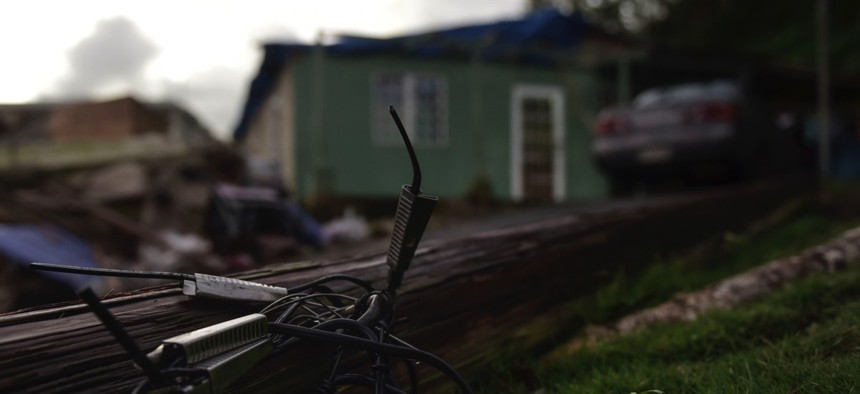Could Puerto Rico Turn Out to Be Trump’s First Infrastructure Win?

A light pole knocked down by the winds of Hurricane Maria remains on the ground in front of the house of the Oliveras González family in Morovis, Puerto Rico. Carlos Giusti / AP Photo
Some officials in the U.S. territory think so. And they’ve already secured a smart cities grant with hopes to expedite resilient hurricane recovery.
Officials in Puerto Rico indicated Wednesday that they believe the U.S. territory can serve as the flagship for President Trump’s infrastructure package, having secured a humanitarian grant earlier in the week to speed hurricane recovery through adoption of smart technologies.
The Smart Cities Council awarded early support to the island’s government Monday, as part of its 2018 Readiness Challenge Grants, which will bolster the government’s integrated planning for smart, replacement infrastructure.
Federal Emergency Management Agency personnel planned to cease food and water shipments to Puerto Rico on Wednesday, before abruptly reversing course after local officials stressed they still had need for essential commodities.
“I believe Puerto Rico could be the place where the administration can really show the world what they want to do improving infrastructure around the nation,” Carlos Mercader, Puerto Rico Federal Affairs Administration executive director, told Route Fifty by phone. “Puerto Rico needs to be rebuilt.”
Between 25 and 30 percent of the island’s population still lacks electricity more than four months after Hurricane Maria devastated its infrastructure and, in particular, Puerto Rico’s power grid. Making the grid more resilient is the top priority, Mercader said, in a way that capitalizes on modern, renewable energy like solar.
Puerto Rico’s government had been in talks with the White House about potential infrastructure projects even before the hurricane, Mercader said, and its Readiness Challenge application focused on “building back better” after the disaster.
"This grant is an invaluable opportunity for Puerto Rico to develop a roadmap for implementing smart technologies and solutions as we rebuild," Puerto Rico’s governor, Ricardo Rosselló, said in a statement.
FEMA’s “unilateral decision” ceasing commodity shipments to the territory “took us by surprise,” Mercader said, as intergovernmental officials were still discussing a transition plan.
Smart city collaborations with NGOs and others with infrastructure knowledge and expertise will become increasingly important as reconstruction begins, Mercader said.
SCC will work with Puerto Rico to develop a readiness roadmap beginning with a March workshop in San Juan. The monetary value of the coalition’s grant was not disclosed.
Since taking office in January 2017, Rosselló has downsized Puerto Rico’s government from 135 agencies to 33 and pushed for a unified technological database to streamline services across agencies. SCC’s grant will help continue those reforms as well, Mercader said.
Critics of Trump’s State of the Union address Tuesday evening, including San Juan Mayor Carmen Yulín Cruz, said the president’s failure to address the reality on the ground in Puerto Rico indicated it wasn’t a priority.
Mercader dismissed the comments as “politics” and said the Puerto Rican government’s current focus was on convincing the U.S. Senate to take up an $81 billion emergency aid bill passed by the House in December. Those funds would also go toward victims of the hurricanes that hit Florida and Texas last year, as well as wildfires in California.
More than 500,000 homes were severely or totally destroyed across Puerto Rico, and efforts to rebuild have not yet begun in many places on the island.
“We’re grateful for what FEMA and other agencies are doing, but obviously there is a need to do more and do it faster. Reconstruction needs to begin as soon as possible,” Mercader said. “The sense of urgency cannot be lost here.”
Dave Nyczepir is a News Editor at Government Executive’s Route Fifty and is based in Washington, D.C.
NEXT STORY: Infusing government with AI, one pilot at a time






